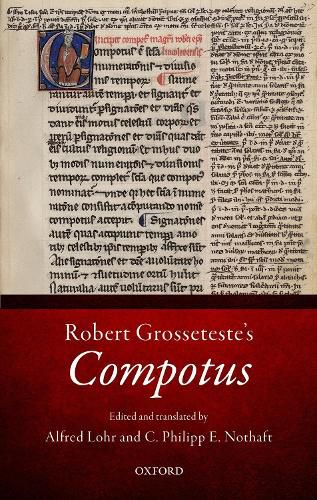Readings Newsletter
Become a Readings Member to make your shopping experience even easier.
Sign in or sign up for free!
You’re not far away from qualifying for FREE standard shipping within Australia
You’ve qualified for FREE standard shipping within Australia
The cart is loading…






Robert Grosseteste (1168/75-1253), Bishop of Lincoln from 1235-1253, is widely recognized as one of the key intellectual figures of medieval England and as a trailblazer in the history of scientific methodology. Few of his numerous philosophical and scientific writings circulated as widely as the Compotus, a treatise on time reckoning and calendrical astronomy apparently written during a period of study in Paris in the 1220s. Besides its strong and long-lasting influence on later writers, Grossteste’s Compotus is particularly noteworthy for its innovatory approach to the theory and practice of the ecclesiastical calendar–a subject of essential importance to the life of the Latin Church. Confronting traditional computistical doctrines with the lessons learned from Graeco-Arabic astronomy, Grosseteste offered his readers a critical and reform-oriented take on the discipline, in which he proposed a specific version of the Islamic lunar as a substitute for the failing nineteen-year cycle the Church still employed to calculate the date of Easter. This new critical edition of Grosseteste’s Compotus contains the Latin text with an en-face English translation. It is flanked by an extensive introduction and chapter commentary, which will provide valuable new insights into the text’s purpose and disciplinary background, its date and biographical context, its sources, as well as its reception in later centuries.
$9.00 standard shipping within Australia
FREE standard shipping within Australia for orders over $100.00
Express & International shipping calculated at checkout
Robert Grosseteste (1168/75-1253), Bishop of Lincoln from 1235-1253, is widely recognized as one of the key intellectual figures of medieval England and as a trailblazer in the history of scientific methodology. Few of his numerous philosophical and scientific writings circulated as widely as the Compotus, a treatise on time reckoning and calendrical astronomy apparently written during a period of study in Paris in the 1220s. Besides its strong and long-lasting influence on later writers, Grossteste’s Compotus is particularly noteworthy for its innovatory approach to the theory and practice of the ecclesiastical calendar–a subject of essential importance to the life of the Latin Church. Confronting traditional computistical doctrines with the lessons learned from Graeco-Arabic astronomy, Grosseteste offered his readers a critical and reform-oriented take on the discipline, in which he proposed a specific version of the Islamic lunar as a substitute for the failing nineteen-year cycle the Church still employed to calculate the date of Easter. This new critical edition of Grosseteste’s Compotus contains the Latin text with an en-face English translation. It is flanked by an extensive introduction and chapter commentary, which will provide valuable new insights into the text’s purpose and disciplinary background, its date and biographical context, its sources, as well as its reception in later centuries.